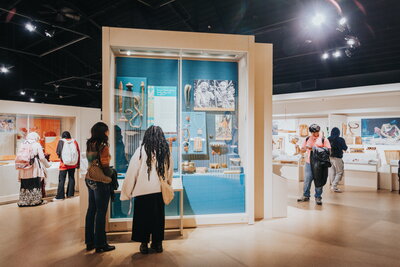
What is history, and why does it matter?

As historians, we study how the past shaped the present and will shape the future. When we try to understand why something happened, whether a shift in political party dominance, the overthrow of a regime, or the extensions of human rights and freedoms, we must look to the past to identify the causes of change. Because everything and everyone has a history, there will always be a need for historians, for the questions they ask, and for the answers they provide.
Discover the past, shape the future

The past isn’t simply the present dressed up in costume; it’s a world of its own, full of intrigue, humanity, and difference. By exploring it, you’ll develop a profound understanding of life and society across time.
“History is who we are and why we are the way we are.” -David McCullough, U.S. historian (1933-2022)
The study of history empowers you to think analytically and critically, understand the foundations of the most pressing problems of the present, build empathy, and become an engaged citizen.
Study History at Illinois
Do you want to gain a better understanding of the world and how we got to where we are today? To learn how movements and ideas spread? Why empires rise and fall? Then History at Illinois is the perfect home for you.
We will guide you in becoming a creator and not just a consumer of history. Along the way, you’ll forge lifelong friendships, learn from world-class teachers, and develop skills that will prepare you for a wide variety of career paths. You’ll join a vibrant community of scholars dedicated to achievement, curiosity, and diversity. And you’ll have lots of fun along the way!
Title
What do students love most about history at Illinois?
History major David Ju shares why he loves the passionate community he has found in the department.
Our Program
History major
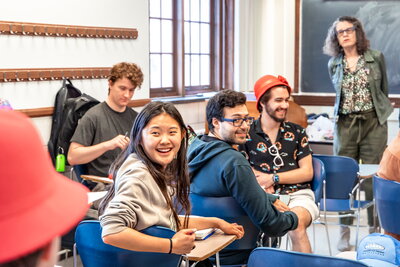
Customize your path through history! Our flexible major allows you to explore your interests and passions, and pair the study of history with learning a language, hands-on experience, undergraduate research, and community engagement. The history major requires 36 credit hours of coursework.
Secondary education track
Want to teach history? Our flexible secondary education track will prepare you for your future career in social studies education. The main difference between this track and the general history major is that this track is designed to provide you with an Illinois social studies teaching license (9th-12th grade). This track requires 33 hours of history + supporting coursework in the social sciences and a 36-39 hour education core.
History minor
Explore fascinating and challenging historical questions and improve your research and writing skills with a history minor. Requires 18 hours of coursework.
A history major pairs well with other coursework

Many history majors pair their studies with coursework in other disciplines. Popular second major options include earth, society, and environmental sustainability, gender and women's studies, political science, psychology, and sociology.
STEM majors find the study of history useful for long-term success in fields such as medicine, which require the ability to communicate clearly, understand different points of view, and work with people from a wide range of backgrounds.
Title
Why choose history at Illinois?
Hear from three freshman history majors about why they chose to study history, their experiences at Illinois, and advice for applicants.
Career Preparation
The history major prepares students for long-term professional success and our alumni have had outstanding success in careers spanning politics, education, law, public service, technology, business, and more.
98% of surveyed 2023-2024 University of Illinois history graduates secured a first destination, which means they’ve gotten jobs, are heading to graduate school, or are volunteering full time (that's higher than the campus average!).
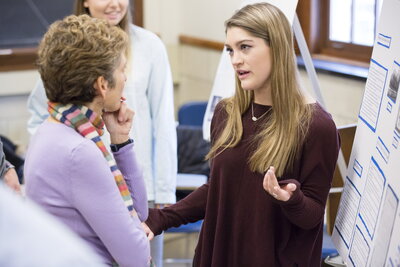
The core skills learned through the study of history include:
- Analytical skills including reading critically, analyzing quantitative and qualitative evidence, and reasoning logically
- The ability to assess evidence and develop persuasive, evidence-based arguments
- The ability to assess conflicting interpretations
- Communication skills, ranging from effective writing to public speaking to preparing reports and summaries of evidence
- Inter-personal and cross-cultural skills and understanding
- Global fluency
- Research and project development skills
These rank among the core skills that are most highly sought after by employers in the 21st century!
Career Resources
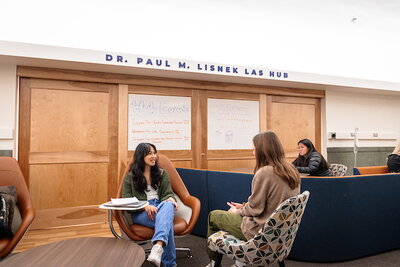
The University of Illinois and College of LAS offer a variety of career counseling services that you can take advantage of as a student. You can access dedicated career support in LAS Career Services, Career Center, and peer support in the LAS Paul M. Lisnek Hub.
Internships
History hosts an internship course - HIST 398: Public History Internship where students develop a program of study or research related to an internship or other relevant employment opportunity. Our students have also interned locally in Champaign-Urbana and across the country and gained extensive experience working in archives, libraries, museums, and advocacy campaigns.
Read student internship stories
Community
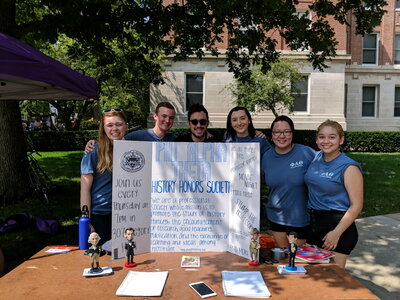
We pride ourselves on offering history students the experience of a small liberal-arts college with the added advantages of a world-class research university. We are committed to supporting our students and working with them to provide an inclusive and tight-knit community. Our majors find a home in:
- Phi Alpha Theta: Promotes the study of history through the encouragement of research, good teaching, publication and the exchange of learning and ideas among historians.
- The Society of Minority Students in History: Supports racial, ethnic, and LGBTQ+ students and strives to dismantle the misconception of what studying history looks like and who scholars of history are.
- History Undergraduate Journal: The Undergraduate History Journal at Illinois leads the effort to publish original undergraduate research. Join the journal team and develop skills in research, editing, and writing, or submit your original research and possibly be featured in the next issue!
Research
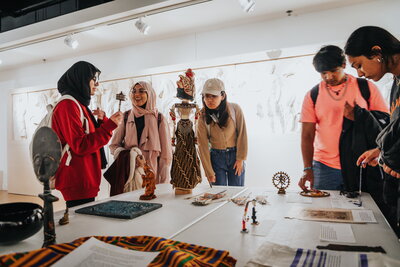
Research is embedded in the history curriculum with an emphasis on transforming students from consumers of history to critical producers of it. All students complete two small research-intensive seminars (HIST 200 and 498) that teach them core research skills.
- Conduct your own research: Faculty work with students in their research programs and students can also receive course credit for conducting their own research under the guidance of a faculty member in our honors program.
- Publishing opportunities: The SourceLab Digital Documentary Publishing initiative and Undergraduate History Journal at Illinois offer opportunities for students to publish their research.
- World-class resources: All students have access to the amazing resources of the second largest university library in the country!
Explore research opportunities
Study Abroad
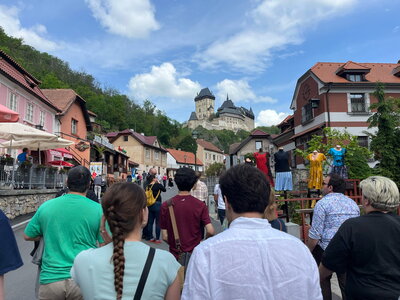
Students can study history where it was made by taking advantage of plentiful study abroad programs. We encourage history students to take advantage of studying abroad, whether for a year, a semester, or a summer. Some students choose to do research for history projects while they are abroad, and obtain some funding from our travel grant program for that purpose. Our students study in the UK, Hong Kong, Australia, the Middle East, and all over the world.
Read student study abroad stories